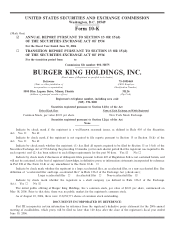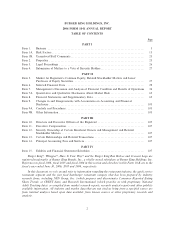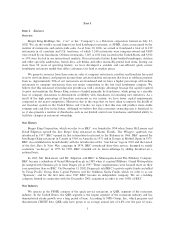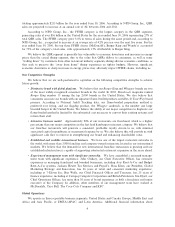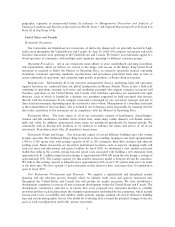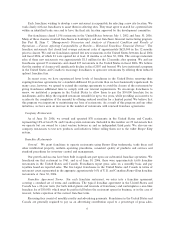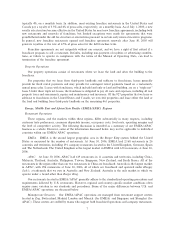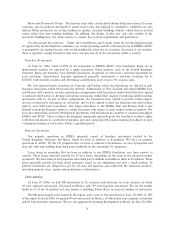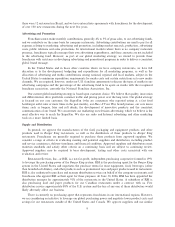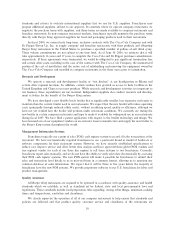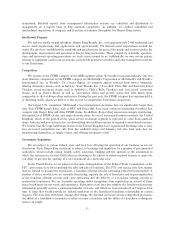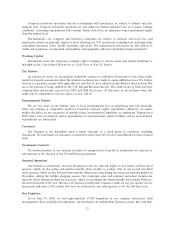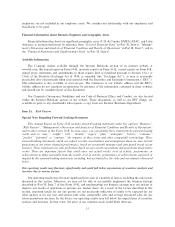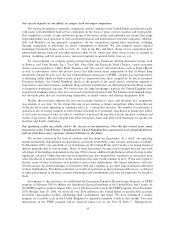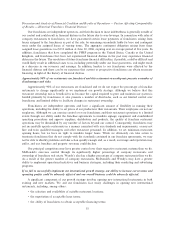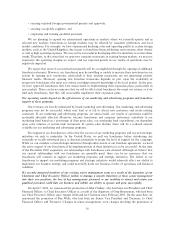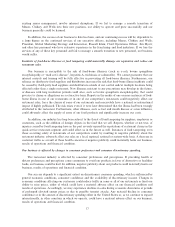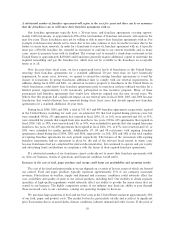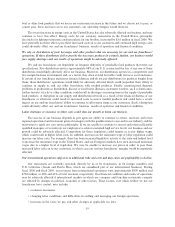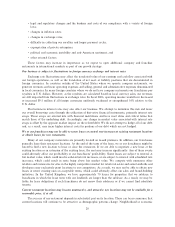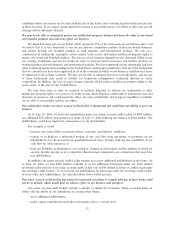Burger King 2006 Annual Report Download - page 23
Download and view the complete annual report
Please find page 23 of the 2006 Burger King annual report below. You can navigate through the pages in the report by either clicking on the pages listed below, or by using the keyword search tool below to find specific information within the annual report.maintained. Detailed reports from management information systems are tabulated and distributed to
management on a regular basis to help maintain compliance. In addition, we conduct scheduled and
unscheduled inspections of company and franchise restaurants throughout the Burger King system.
Intellectual Property
We and our wholly-owned subsidiary, Burger King Brands, Inc., own approximately 2,480 trademark and
service mark registrations and applications and approximately 354 domain name registrations around the
world. We also have established the standards and specifications for most of the goods and services used in the
development, improvement and operation of Burger King restaurants. These proprietary standards, specifica-
tions and restaurant operating procedures are trade secrets owned by us. Additionally, we own certain patents
relating to equipment used in our restaurants and provide proprietary product and labor management software
to our franchisees.
Competition
We operate in the FFHR category of the QSR segment within the broader restaurant industry. Our two
main domestic competitors in the FFHR category are McDonald's Corporation or McDonald's and Wendy's
International, Inc. or Wendy's. To a lesser degree, we compete against national food service businesses
offering alternative menus, such as Subway, Yum! Brands, Inc.'s Taco Bell, Pizza Hut and Kentucky Fried
Chicken, casual restaurant chains, such as Applebee's, Chili's, Ruby Tuesday's and ""fast casual'' restaurant
chains, such as Panera Bread, as well as convenience stores and grocery stores that offer menu items
comparable to that of Burger King restaurants. During the past year, the FFHR category has experienced flat
or declining traffic which we believe is due in part to competition from these competitors.
Our largest U.S. competitor, McDonald's, has international operations that are significantly larger than
ours. Non-FFHR based chains, such as KFC and Pizza Hut, have many outlets in international markets that
compete with Burger King and other FFHR chains. In addition, Burger King restaurants compete internation-
ally against local FFHR chains, and single-store locations. In one of our major European markets, the United
Kingdom, much of the growth in the quick service restaurant segment is expected to come from sandwich
shops, bakeries and new entrants that are diversifying into healthier options to respond to nutritional concerns.
We believe that the large hamburger chains in the United Kingdom have experienced declining sales as they
face increased competition not only from the sandwich shops and bakeries, but also from pubs that are
repositioning themselves as family venues and offering inexpensive food.
Government Regulation
We are subject to various federal, state and local laws affecting the operation of our business, as are our
franchisees. Each Burger King restaurant is subject to licensing and regulation by a number of governmental
authorities, which include zoning, health, safety, sanitation, building and fire agencies in the jurisdiction in
which the restaurant is located. Difficulties in obtaining or the failure to obtain required licenses or approvals
can delay or prevent the opening of a new restaurant in a particular area.
In the United States, we are subject to the rules and regulations of the Federal Trade Commission, or the
FTC, and various state laws regulating the offer and sale of franchises. The FTC and various state laws require
that we furnish to prospective franchisees a franchise offering circular containing proscribed information. A
number of states, in which we are currently franchising, regulate the sale of franchises and require registration
of the franchise offering circular with state authorities and the delivery of a franchise offering circular to
prospective franchisees. We are currently operating under exemptions from registration in several of these
states based upon our net worth and experience. Substantive state laws that regulate the franchisor/franchisee
relationship presently exist in a substantial number of states, and bills have been introduced in Congress from
time to time that would provide for federal regulation of the franchisor/franchisee relationship in certain
respects. The state laws often limit, among other things, the duration and scope of non-competition provisions,
the ability of a franchisor to terminate or refuse to renew a franchise and the ability of a franchisor to designate
sources of supply.
11


